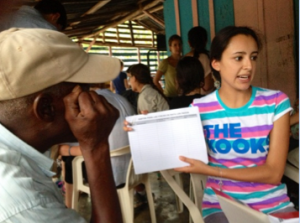By Rebecca Willett
Just a few weeks ago, 31 SEI students completed a month-long field study program in the Dominican Republic. This trip marked the fifth year of the Social Enterprise Institute’s Dominican Republic Field Study program, and we are excited to count this one as another great success, alongside our partner microfinance organization, Esperanza International, and our host institution, Instituto Tecnológico de Santo Domingo (INTEC).
Students spent the first two weeks with their peers from INTEC conducting research for Esperanza on client retention both in the classroom and in the field. Each day they traveled to different locations to interview microloan borrowers, everywhere from urban communities in the capital to rural sugar cane-producing villages called bateyes. During the four weeks, between their fieldwork and other weekend cultural excursions, the students were fortunate enough to get to know many different areas of the country, from San Pedro de Macoris in the rural East, known for their sugar cane and their baseball players, to the picturesque peninsula of Samaná in the Northeast.
After gaining in-depth knowledge about different models of social enterprise, and taking a critical but balanced look on the benefits and challenges of microfinance from Professor Dennis Shaughnessy, it was time for the students to apply their knowledge to a real life situation. Under the guidance of Professor Gordon Adomdza, the students utilized the Human-Centered Design process to design two income-generation projects in two rural bateyes. And, thanks to the Catalyst fundraising campaign and the extremely generous contributions of friends and family, the students were able to raise nearly $8,000, which allowed them to implement the projects they had designed.
Livestock and Savings in Mata Los Indios
SEI has a long history working in Mata Los Indios, and we continued this tradition yet again this year with a brand new and very unique project designed entirely by the students. After hours of community meetings and personal interviews with locals, the students created an innovative project that works to alleviate two huge challenges in the community: food insecurity and lack of income.
The project starts with the purchase of seven cows and distributing them to seven families in the community through a lottery system. Then, when the cows give birth, each family must give away the calf to another family in the community—quite literally a gift that keeps on giving! Having a source of milk will allow families to improve their nutrition as well as earn extra income. Furthermore, taking from a classic “rotating savings” model, each family that owns a cow has the responsibility of saving 25 cents each week, which they contribute to a community savings fund. Once a month, this fund will be distributed in a lump sum to two individuals.
Sewing Cooperative and Savings in El Caño
In El Caño, another rural community, the students found that there was a great need for vocational and financial literacy training, especially for youth who have few skills or opportunities. Thus the first part of the project was the creation of a sewing cooperative along with vocational training, to allow people in the community to develop and benefit from a new skill. This will be accompanied by financial literacy training, which will teach people about money management and the importance of savings. Additionally, savings groups will be established in the community to help them carry out what they have learned in the financial literacy training, and which will culminate in a rotating “lump sum” being given to different members of the group each month.
Moving Forward
The most exciting part of these projects is that the next steps have already been taken to make them a reality! In El Caño, the students ordered 13 sewing machines for the sewing cooperative, which, thanks to the tireless work of in-country Esperanza coop Melissa Furci, have recently been successfully delivered to the community. In Mata Los Indios, our partner organization, MOSCTHA, will soon be going to an actual livestock market to purchase the cows!



